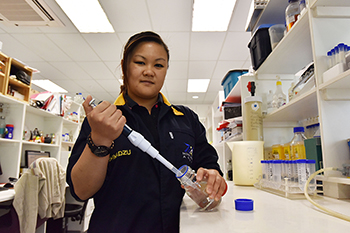Latest News Archive
Please select Category, Year, and then Month to display items
13 August 2024
|
Story Anthony Mthembu
|
Photo Sibahle Dayimani and Amandla Kulu
 Prof Peter Roseel, Managing Director of Management Consulting and Research – a spin-off of the Catholic University of Leuven in Belgium; and Prof Nicolene Barkhuizen, Director of the UFS Business School.
Prof Peter Roseel, Managing Director of Management Consulting and Research – a spin-off of the Catholic University of Leuven in Belgium; and Prof Nicolene Barkhuizen, Director of the UFS Business School.
The Business School at the University of the Free State (UFS) hosted Prof Peter Rosseel, Managing Director of Management Consulting and Research – a spin-off of the Catholic University of Leuven in Belgium – for a guest lecture during his visit to the UFS Faculty of Economic and Management Sciences (EMS).
The guest lecture took place on 19 July 2024 in the Business School Auditorium and was attended by academics from the UFS.
Reflecting on the lecture
The lecture presented by Prof Rosseel focused on how combining strategy, strategy implementation, culture transformation, leadership, and learning successfully leads to sustainable growth, creates engagement, and delivers tangible results. Throughout the lecture, Prof Rosseel spoke about how experts tend to make bad leaders and therefore stop change from happening within an organisation. In fact, he highlighted that, “Experts stop change from happening within the workplace because experts, by definition, look through the eyes of their expertise, but you cannot reduce the world to different forms of expertise, as it is holistic.” As such, he argued that to change an organisation, one must see things from the point of view of others.
Furthermore, Prof Rosseel delved deeper into the hierarchical operating model within organisations. He indicated that the above model should be one community within organisations; however, unfortunately it is not. This is because organisations are made up of several departments such as finance and human resources. As such, he regards these departments to be silos that could prove to be detrimental to organisations, as each silo can create its own culture as opposed to an organisational culture. These are some of the points he discussed throughout the lecture.
After the lecture concluded, the audience had the opportunity to engage with Prof Rosseel on his viewpoints. In fact, Lyle Markham, Academic Head of Department and Lecturer in Industrial Psychology at the UFS, was one of the audience members and described the lecture as insightful.
The impact of personal care products on water resources in the Free State
2015-12-14

Jou-an Chen
Photo: Charl Devenish
|
Water is of the utmost importance in personal hygiene. Most people can hardly have a day go by without taking a shower in the morning and at night. However, it is this very habit that is increasingly polluting the water resources in South Africa.
Contaminants found in pharmaceutical and personal care products have been accumulating in water masses in recent years. These contaminants especially refer to hormones in medication, as well as colouring agents and fragrances used in soap, shampoo and body lotions.
“Little information and data are available on the prevalence of these contaminants, and on how high the level of pollution really is,” says Jou-an Chen, researcher in the Department of Microbial, Biochemical and Food Biotechnology at the UFS.
Her research particularly focuses on the prevalence and impact of those contaminants.
“Because these substances have not been properly investigated, we are not sure how widely it occurs and whether it is harmful to the environment. It was precisely the lack of information that has inspired me to investigate further.”
“If we could identify the contaminants and what it is doing to the environment, it could make a valuable contribution to directives on water quality standards.”